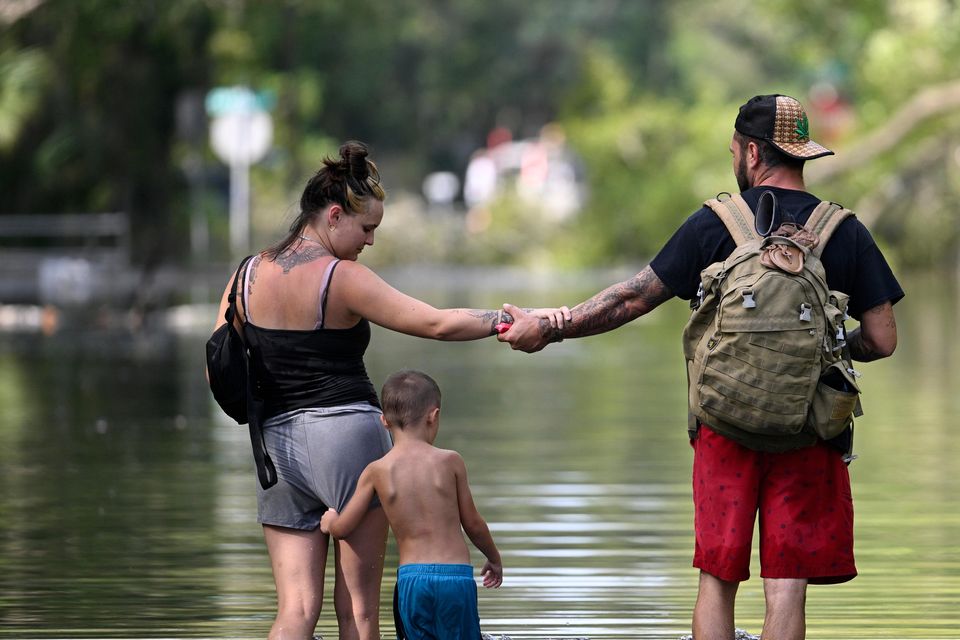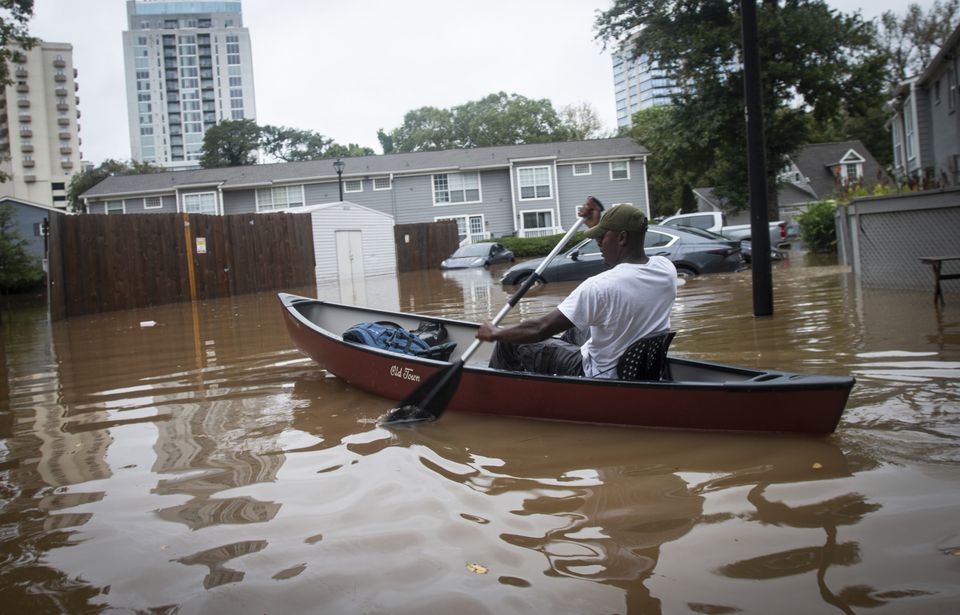At least 40 people have been killed in four states after Hurricane Helene left a path of destruction across Florida and the south-eastern US.
Rescue attempts were underway to save people from floodwaters after the Category 4 hurricane made landfall late on Thursday in the sparsely populated Big Bend area of Florida with sustained winds of up to 140mph.
It weakened to a post-tropical cyclone on Friday with millions of people left without power, as well as hospitals in southern Georgia, according to Governor Brian Kemp.
At least 15 people have died in Georgia from causes related to Hurricane Helene, according to a spokesman for Mr Kemp.
Dustin Holmes, second from right, holds hands with his girlfriend, Hailey Morgan, while returning to their flooded home with her children Aria Skye Hall, 7, right, and Kyle Ross, 4, in Crystal River, Florida (Phelan M Ebenhack/AP)
All five who died in one Florida county were in neighbourhoods where residents were told to evacuate, said Bob Gualtieri, the sheriff in Pinellas County in the St Petersburg area.
Some who stayed ended up having to hide in their attics to escape the rising water.
“We tried to launch boats, we tried to use high-water vehicles, and we just met with too many obstacles,” Sheriff Gualtieri said, adding that the death toll could rise as crews go door-to-door in flooded areas.
In Tampa, some areas could be reached only by boat.
Florida Governor Ron DeSantis said the damage from Helene appeared to be greater than the combined damage of Hurricanes Idalia and Debby in August.
“It’s demoralising,” he said. “It’s not easy to go through this. It’s not going to be easy in the immediate future, but there’s going to be a light at the end of the tunnel.”
President Joe Biden said he was praying for survivors, and the head of the Federal Emergency Management Agency headed to the area. The agency deployed more than 1,500 workers and they helped with 400 rescues by late morning.
More deaths were reported in Georgia and the Carolinas, including two South Carolina firefighters who died when a tree struck their truck.
The death toll in South Carolina is 19 with many of the deaths from falling trees as the storm moved through early on Friday, authorities said.
Helene is the deadliest tropical storm in South Carolina since Hurricane Hugo killed 35 people when it came ashore just north of Charleston in 1989.
The wreckage extended hundreds of miles northward to northeast Tennessee, where a “dangerous rescue situation” by helicopter unfolded after 54 people were moved to the roof of the Unicoi County Hospital as water rapidly flooded the facility.
Everyone was rescued and no one was left at the hospital by late Friday afternoon, Ballad Health said.
An unidentified man paddles a canoe to rescue residents and their belongings at a flooded apartment complex in Atlanta (Ron Harris/AP)
In North Carolina, a lake featured in the movie Dirty Dancing overtopped a dam and surrounding neighbourhoods were evacuated, although there were no immediate concerns it would fail.
People also were evacuated from Newport, Tennessee, a city of about 7,000 people, amid concerns about a dam, although officials later said the structure had not failed.
A mudslide in the Appalachian Mountains washed out part of an interstate highway at the North Carolina-Tennessee state line.
Another slide hit homes in North Carolina and occupants had to wait more than four hours to be rescued, said Ryan Cole, the emergency services assistant director in Buncombe County. His 911 centre received more than 3,300 calls in eight hours on Friday.
In Georgia, Atlanta received 28.2cm of rain in 48 hours, breaking the record from 1886 according to the Office of the State Climatologist.
Fox weather reporter Bob Van Dillen interrupted his live report in Atlanta to rescue a woman from a vehicle stranded by rising floodwaters.
Nearly four million homes and businesses were without power in Florida, Georgia and South Carolina, according to poweroutage.us.
Financial services company Moody’s Analytics put the property damage between 15 billion dollars (£11.2 billion) and 26 billion dollars (£19.4 billion) .
Helene also swamped parts of Mexico’s Yucatan Peninsula, flooding streets and toppling trees as it brushed past the resort city of Cancun a day before hitting the US. It also knocked out power to more than 200,000 homes and businesses in western Cuba.
Tropical Storm John made its second landfall along Mexico’s Pacific coast on Friday, while in its wake authorities in the resort city of Acapulco called for help from anyone with a boat to deal with the flooding.
John came ashore near Tizupan in Michoacan state with sustained winds of 45mph after making its initial landfall farther east on the coast on Monday as a Category 3 hurricane.

